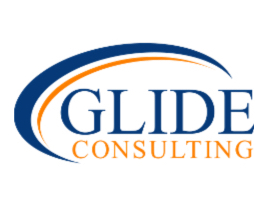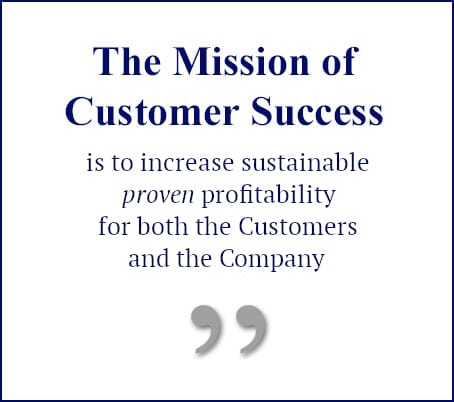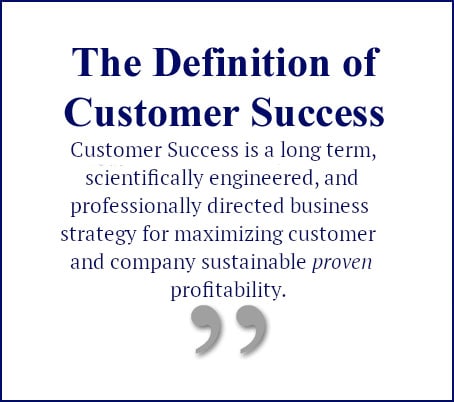When I first began formal research into the emerging profession of Customer Success over 9 years ago, there were no CS groups that reported any direct connection to income channels — either owned or shared. In the 2017 Customer Success Standards Initiative Research survey, around 50% of the respondents indicated that their groups either owned some revenue channels outright or had shared credit for them. A year later, only 26% of groups didn’t have any connection to revenue. The preliminary results for 2019 show that about 20% lack any revenue responsibilities. The trend is clear. It’s time to have a serious conversation about the monetization of Customer Success and what it means to the profession.
Customer Success and Revenue
 The Mission of Customer Success is to build more proven value faster for both the customers and the company. Reducing churn and increasing adoption are things that every customer success team does on a regular basis; they and a range of other activities are part of the role and always will be. But the essential CS mission is about increasing proven value — enhanced productivity and profitability — and that means money for the customers and for the company.
The Mission of Customer Success is to build more proven value faster for both the customers and the company. Reducing churn and increasing adoption are things that every customer success team does on a regular basis; they and a range of other activities are part of the role and always will be. But the essential CS mission is about increasing proven value — enhanced productivity and profitability — and that means money for the customers and for the company.
Customer Success groups in software companies report that they are associated, either as authentic owners of or where credit is shared between themselves and other groups of the company, with the following major revenue conduits:
- Contract Renewals
- Up-sells of additional seats/licenses/bandwidth
- Cross-sells: Other products
- Cross-sells: Support
- Cross-sells: Training
- Cross-sells: Customer Success services
- Cross-sells: Technical/Professional Customizations, etc.
Customer Success as a product is no new thing. Companies have been offering Customer Success as a billable service for years. Sometimes it is bundled into the subscription costs for larger customers, and offered as a separate product to smaller ones. The data indicates an increase in the numbers of companies with Customer Success services broken out, and I think we’re going to see more of this in the next few years, just as we did with numbers of CS groups connected to revenue. However, there is a barrier that will have to be overcome in order to succeed with Customer Success as a separately billable service.
The Business of Customer Success
 I’ve noticed a curious reluctance from many customer success professionals to talk directly about money either to their customers or to their companies. Why should this be difficult or sensitive? Isn’t the ROI from their ongoing investments in your company of vital interest to the decision-makers at the customer end? I can assure you that the ROI directly attributable to the CS team is of significant interest to your C-Suite and Board. How are either of your customer groups going to get defensible data about increasing their proven value if you don’t give it to them directly? Customer Value Reviews, for *both* your external and internal customers, need to be a necessary, core aspect of the profession. Delivered in monetary terms, these are the Customer Success performance metrics that count. Can you afford to take a chance on this?
I’ve noticed a curious reluctance from many customer success professionals to talk directly about money either to their customers or to their companies. Why should this be difficult or sensitive? Isn’t the ROI from their ongoing investments in your company of vital interest to the decision-makers at the customer end? I can assure you that the ROI directly attributable to the CS team is of significant interest to your C-Suite and Board. How are either of your customer groups going to get defensible data about increasing their proven value if you don’t give it to them directly? Customer Value Reviews, for *both* your external and internal customers, need to be a necessary, core aspect of the profession. Delivered in monetary terms, these are the Customer Success performance metrics that count. Can you afford to take a chance on this?
In the current survey, the preliminary indications are that less than 10% of reporting groups are evaluated on a P&L basis. I suspect, frankly, that this is because the customer success groups don’t track their operational costs, and therefore could not accurately report profit. I know that when I ask questions about costs in the course of operational Reviews, the answers are few and of questionable accuracy. This is a core problem. How can you make sound decisions about prioritization of CSM activities, or design a viable “tech-touch” or “Self-Success strategy for customers without cost data?
The turnover in Customer Success executive ranks ought to be a matter of concern to the profession, especially when taken together with another uncomfortable topic — the number of Customer Success groups that have been obliterated entire. If you don’t want to be in the At-Risk category, either personally or along with your entire team, it’s time to start consistently proving the increase in sustainable value you bring to both customers and company.
The Profitability Blueprint
The 2019 Customer SuccessCon program will focus on value provability for Customer Success teams. We’ll examine a range of issues, including: What’s involved in actually charging customers for Customer Success services? How do you talk to customers openly about the ROI they are receiving from the continuing relationship with your company? Making sure your executive team understands the positive impact your CS team has on sustainable profitability is critical. What are the specific tactics and actions you can take to get the executive team to commit the time, budget, resources and internal alignment you need? Making a strong argument to secure more resources isn’t impossible. It just requires a deeper dive into the numbers to ensure your investment makes financial sense.
Recommended Reading:
Customer Success and Value Provability









